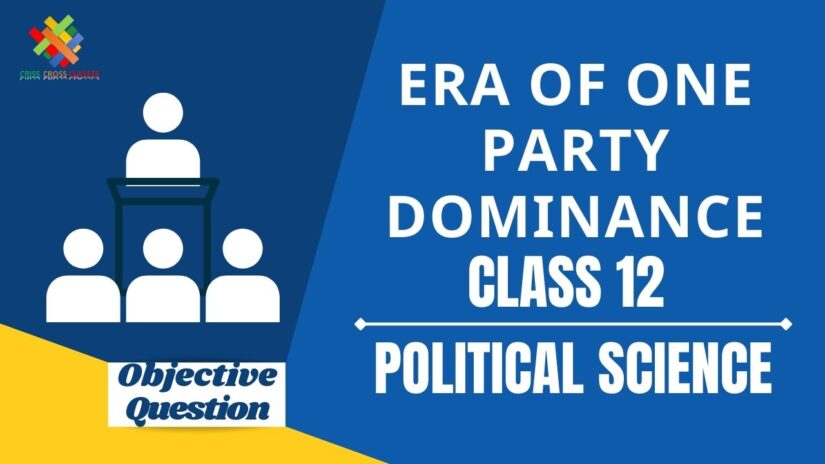Chapter – 2
Era of One Party Dominance
Class 12 Political Science Chapter 2 Era of One Party Dominance Objective Questions in English. These Objective Questions are helpful for the students who are in class 12 and have Political Science. Attempt These Objective Questions to Check your knowledge and the status of your preparation. These Objective Questions are also helpful for the preparation of 1 Mark Questions
| Board | CBSE Board, UP Board, JAC Board, Bihar Board, HBSE Board, UBSE Board, PSEB Board, RBSE Board |
| Textbook | NCERT |
| Class | Class 12 |
| Subject | Political Science |
| Chapter no. | Chapter 2 |
| Chapter Name | Era of One Party Dominance |
| Category | Class 12 Political Science Objective Questions in English |
| Medium | English |
Era of One Party Dominance
Objective Questions in English
- When was the Indian National Congress formed?
- January 1980
- January 1985
- December 1885
- December 1985
- When did the Indian Constitution come into force?
- 15 August 1947
- 26 November 1949
- 31 March 1950
- 26 January 1950
- When was the Election Commission set up in India?
- January 1950
- January 1949
- March 1950
- March 1952
- Which organisation conducts free and fair elections in India?
- Constituent Assembly
- Lok Sabha
- Election Commission
- Neither of the above
- Who was the first election commissioner of India?
- Sukumar Sen
- Dr. Bhimrao Ambedkar
- VP menon
- Neither of the above
- When were the first general elections held in India?
- In 1947
- In 1952
- In 1951
- In 1955
- What was the approximate number of voters in the first general election?
- 36 crore
- 40 crore
- 17 crore
- 200 million
- How many seats were earmarked for the Lok Sabha in the first general election?
- 543
- 494
- 502
- 489
- How many seats did the Congress win in the first general election?
- 350
- 494
- 364
- 405
- Which party got the maximum number of seats after the Congress in the first general election?
- Communist Party of India
- Hindu Mahasabha
- Bharatiya Jana Sangh
- Socialist Party
- How many seats did the Communist Party of India get in the first general election?
- 12
- 14
- 16
- 09
- When was the second general election held in India?
- 1957
- 1956
- 1955
- 1962
- What was the total number of Lok Sabha seats in the second general election?
- 489
- 494
- 464
- 543
- How many seats did the Congress win in the second general election?
- 364
- 361
- 365
- 371
- How many seats did the Communist Party of India get in the second general election?
- 16
- 27
- 35
- 37
- When did the first non-Congress government form in Kerala?
- In 1957
- In 1967
- In 1952
- In 1962
- Which party formed the government in Kerala in 1957?
- Bharatiya Jan Sangh
- Kisan Praja Party
- Communist Party of India
- Neither of the above
- Who became the Chief Minister of Kerala in 1957?
- Mr. Syama Prasad Mookerjee
- Vishvajeet Singh
- M. Nijalingappa
- E. M. S. namboodiripad
- When was the Socialist Party formed?
- In 1934
- In 1936
- In 1948
- In the 1950s


